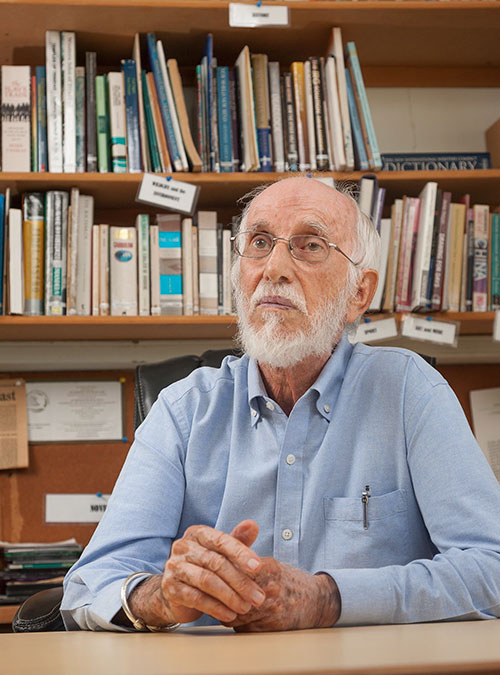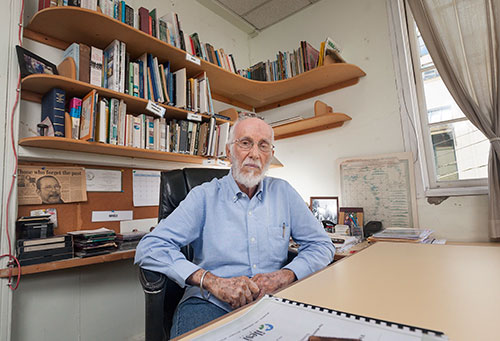
Click on headline to Read More
Voices in the Land
Photographs by Mark Lyndersay.
 My name is Ivan Laughlin and, although I am Trini to the bone, I am Caribbean in the marrow.
My name is Ivan Laughlin and, although I am Trini to the bone, I am Caribbean in the marrow.
I’m a war baby, born 15 January 1942. Muhammud Ali is the 17th.
When they were sprinkling [greatness] they passed me and touched him first.
As a five-year-old, I used to walk from Long Circular Rd to the Savannah, take the tram to CityGate, pick up two packs of nuts and go back. Or take the bus down Long Circular Rd to Cipriani Blvd, where Miss Eccle’s school was, and go back by bus, all by myself, at age five.
My parents split up when I was about seven. My mum took us to live with my grandmother, Evelyn Anderson, on the Maracas Estate. The move from the urban to the rural had a striking impact on me.
At the Abbey School, I was one of maybe 25 day boys amongst the 150 boarders. [One day], in form two, the maths teacher was sick and the principal, Fr Isle de France, took the geometry class. He said, “Laughlin, go on the blackboard and describe theorem one”. I couldn’t understand it and couldn’t explain it. He said, “You don’t understand the language! I began to see maths in a different way. Literature and maths have a connection, [which is] the language that goes with them. How Fr Isle taught us theorem one was a revelation.
Fr Isle taught us how to draw maps as rectangles. Chupara Point is the most northerly point of Trinidad. You trace it to Galeota, then down to Galera – you frame Trinidad in that way and you suddenly understand where Icacos was, San Fernando and so on. He did the same thing with Barbados, Jamaica, Guyana. All of a sudden, I’m seeing the Demerara and Essequibo Rivers, Suriname, Brazil, Venezuela. I learned the Cockpit Country in Jamaica and all of the Caribbean that way.
The land became the centre of my understanding.
My love for the land was nurtured by my grandmother, by Miss Eccles and the Abbey Schools – and by cricket! Puss Achong, the left-arm googly bowler – they named it “the Chinaman” after him – Clifford Roach, the West Indies 1930s prolific opening batsman and Lance Murray, father of Derek [all trained us]. To hear these fellas talk about playing cricket in the 30s was like a semester in a university.
My mother and my grandmother shaped me. These two strong, remarkable women were feminists before the word was even used.
When people ask my religion, I say I am a wanderer – because I wander the land. And, when I wander the land and hear the birds and feel the breeze, I start to wonder. That’s my religion.
Lance Murray, was a land surveyor. After cricket training one day, he said, “Laughlin, what you planning to do?” I had just finished O Levels. I couldn’t do A Levels because my mother and father had split up and, in those days, there was no free secondary education. He said, “Come and do land surveying with me”. So that’s what I did.
Aged 17, I went to work in the government service as an apprentice land surveyor at $3.50 a day. I was actually like a labourer.
[First black full-series West Indies captain] Frank Worrell took charge just when [first Jamaican Prime Minister Alexander] and [first Trinidad & Tobago Prime Minister Eric] Williams, between them, killed the West Indies Federation. I saw the Federation collapse [under politicians] and I heard Frank Worrell saying the Leeward & Windward Islands had to be in West Indies cricket. Until then, the team was picked from just Guyana, Barbados, Trinidad and Jamaica. At the same time the politicians were breaking up the islands, Worrell was combining them!
In 1966, [after much simi-dimi] I asked [world-famous intellectual] CLR James, who was a Workers & Farmers Party general election candidate, to speak to [me and my student friends]. I was 23 and completely overwhelmed. Imagine me chairing a meeting at which CLR James spoke! It was after midnight when we got back to [his digs]. We sat in the car and spoke for two hours. He said, “Ivan, tomorrow morning, I’m going to lie in my bed late and contemplate the veracities of life!” Those were his final words to me. Here he was, a philosopher of the highest order, talking to a boy in his early 20s!
I was thinking of going to Canada to extend my studies when [New World Group member and Tapia House Movement leader] Lloyd Best said, “No, no, no, man. UWI is the place to learn what you have to do.” And, so help my God, that’s what I did.
I did a BA in economics and government at UWI and became a member of the New World Group. Learning about the Caribbean from these astonishing Caribbean minds was the big thing! It made my life, whatever it became!
I spent a year in Tobago before I even qualified. I literally walked the length and breadth of Tobago, double-checking the plans. I learnt about the land that way. I met the most remarkable people, simple folk who understood what survival is.
Every time I hear Andre Tanker’s exceptional composition, Morena Osha, its rhythm and poetry, I remember standing on the top of a slope in Kenya in 1987, looking down at Masai womenfolk washing clothes in a river. I caught a glimpse of a young woman, bare-breasted, short-haired – a representation of true African beauty. This sight, I have never forgotten.
[Guyanese writer] Wilson Harris, for me, was [a hero] because he was a land surveyor! He saw the mysticism of the land in Guyana. Palace of the Peacock [shows what] a remarkable thinker he was.
In Tobago, I passed Englishman’s Bay and got up on to the ridge overlooking Palatuvier. When I looked down from there, I thought I was in the Garden of Eden.
My perspective is, how you shape the land, is how you shape the civilization. The land tells you what to do. We don’t need mega-projects; we just have to listen to the voices of the land.
A week after signing a three-week contract to look at land issues in Belize, on Independence Day, 1994, I fell off the side of a cliff. Cracked my skull. Broke my leg in two places. They gave me three hours to live. They had to take off part of the skull and sew a burst vein in the brain. Dr Mahadeo told me I wouldn’t be able to work for nine months. I said, “I’m flat broke, I got to work.” He said, “Okay, go and work for three hours and rest for two. No more than that.” I worked ten hours a day for three weeks and travelled from Belize to Guatemala and Mexico. Then I went to do the same thing in Turks & Caicos.” After six weeks, I came back to the doctor. He said, “But Ivan, you’re in great health! What happened?” I told him, “Hard work!”
I’ve been a vegetarian for 40 years.
[National Alliance for Reconstruction Prime Minister ANR] Robinson [appointed] me chairman of the National Housing Authority, where I developed the sou-sou land approach. My “Sou-Sou Land Story” was selected by the United Nations as one of the ten finest human settlement issues for low-income people. We won an award. I wrote it myself and gave it to the company.
Women are the hope for the future of mankind. Thank God!
Russia had invaded Afghanistan and .25 million refugees came through the Khyber Pass and they had to redo the city of Peshawar to accommodate them. They selected six people from all over the world to give their views on it – and I was one.
In Karachi, they thought I was a Pathan because of the colour of my skin, my beard, my nose. The taxi-driver talked to me in Urdu or Arabic, Pashtun, whatever it was, before, in broken English, he asked where I was from. I told him the West Indies. He said, “You know [legendary Barbadian cricketer Sir Garry] Sobers? [Jamaican fast bowler Michael] Holding? [Antiguan master batsman Viv] Richards?” I said I knew them all. He put his arms around me and hugged me. Now, THAT is globalization! Not all these politicians talking this-or-that!
When the volcano erupted in Montserrat, the British government had to send a contingent to look at Plymouth, the capital, and 20 per cent of the island being devastated. I was recommended. I designed two settlements for the refugees who were living in school classrooms.
In 2004, Hurricane Ivan hit Grenada and US Aid [asked me] to look at how they could deal with family land [issues, so that] people could collect the aid they wanted to provide. The female immigration officer at the airport looked at my passport “Your name is Ivan?” I nodded. She said, “Why you coming back to Grenada? We now trying to deal with you!” I ended up spending two years in Grenada, doing a human settlement perspective for the whole island. It led to me doing a guest lecture at Yale University.
I dealt with disaster issues in different circumstances in the world and [relied on] the things I learned from Sou-Sou Lands and Tapia. The way I utilized that is the way we could shape the world. Trinidad has the best possibility of signaling to the world how to cope with that – but the political institutions have failed us from that standpoint. That is why I get depressed. [Because] I see what is possible.
I NEVER think, “It’s too late!” No matter what happens in the world, something comes out of whatever it is, which suggests another possibility. The [operative] word is, “suggest” – and, if you don’t grasp that... So I never stop suggesting. I’m a great suggester.
I don’t like the words, “Trini”, “Trinbagonian”, whatever. I prefer to say I’m a Caribbean person from the islands of Trinidad & Tobago. But, if I have to, I’d say a Trini is someone who UNDERSTANDS and loves the land.
To me, Trinidad & Tobago means this land of ours.
